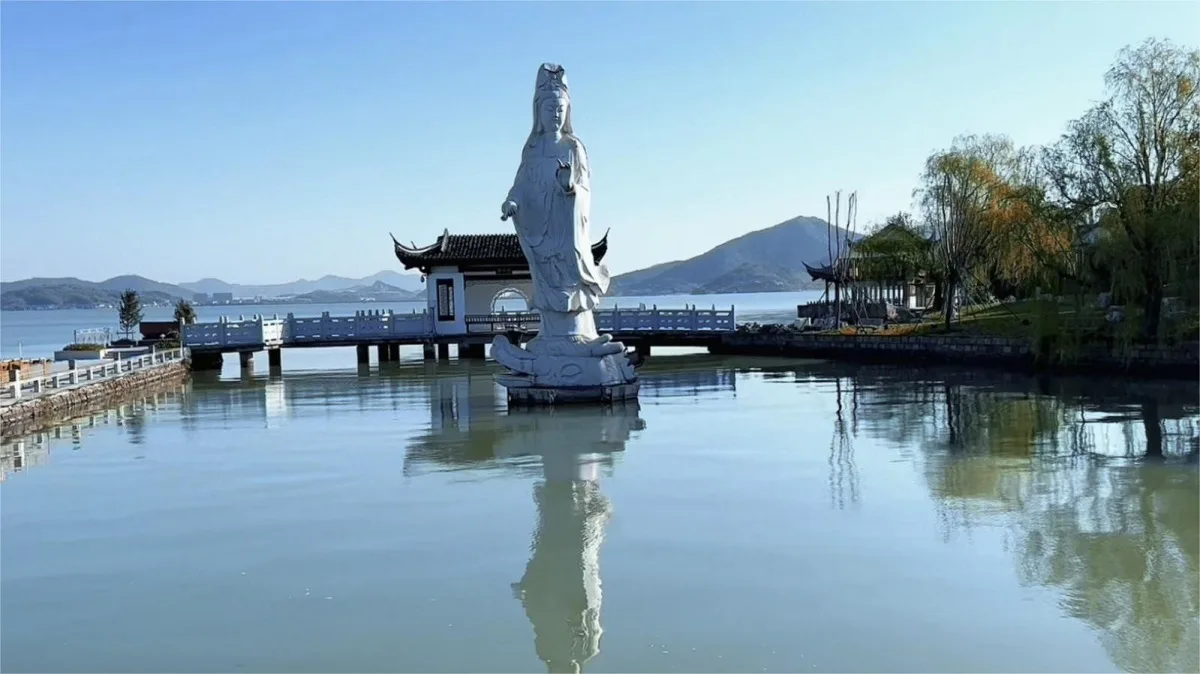Dongqian Lake (东钱湖), comprised of Guzi Lake, Meihu Lake, and Waihu Lake, spans approximately 8.5 kilometers from north to south and 6.5 kilometers from east to west, covering an area of 22 square kilometers. It stands as the largest natural freshwater lake in Zhejiang Province, boasting three times the area of Hangzhou‘s West Lake. With a history spanning over 1200 years, the lake has undergone various expansions and renovations, enhancing its grandeur through the ages.
Surrounding Dongqian Lake are several scenic spots including Xiaoputuo, Taogong Island, Fuquan Mountain, the Southern Song Dynasty Stone Carvings Park, and the Yageer Animal Park. Additionally, there are numerous natural villages and small parks scattered along its shores. Multiple bus routes encircle the lake, providing convenient access to most major attractions.
The most popular spot around Dongqian Lake is the Changdi area near Xiaoputuo, known for its extended embankment. The Xiayu Zen Temple, situated at the center of the lake, attracts many visitors who come to burn incense and pray for blessings. While it’s possible to take a battery-powered car directly to the Water Guanyin statue, strolling along the embankment offers a more leisurely way to appreciate the scenic beauty of Dongqian Lake.
Table of Contents
Basic Information
| Estimated Length of Tour | 1 day |
| Ticket Price | Free |
| Opening Hours | The lake area is accessible 24 hours a day, while most attrations operate from 8.00 to 17.00 |
| Telephone Number | 0086-0574-83015959 0086-0574-88373737 |
Location and Transportation
Dongqian Lake is located within the jurisdiction of Yinzhou District, Ningbo City, Zhejiang Province, China, approximately 15 kilometers to the east of downtown Ningbo. To get to the area, you can choose one of the following ways:
- Take bus routes 906, 902, 903, 905, 106, 620, or others to Dongqian Lake Town.
- Take bus route 901 to reach Taogong Island and Xiaoputuo Scenic Area.
- Take bus route 960 to access Fuquan Mountain Scenic Area, Shilisi Xiang, and Lvyao Ao, among other attractions.
- Take the lakeside loop bus route 966 to reach most lakeside attractions, with a fare of 3 yuan per person.
Highlights of Dongqian Lake
Merchant Culture

Over 2000 years ago, the legendary figure Fan Li retreated to the shores of Dongqian Lake with Xi Shi, leading to the emergence of a prosperous merchant culture. Their story, filled with tales of wealth and love, echoes through the ages. In modern times, with the advent of the “Five Ports Open to Trade” policy, numerous entrepreneurs from Ningbo ventured overseas, establishing a prominent Ningbo business community known for its influence and success.
Buddhist Architecture

Dongqian Lake is home to several significant Buddhist temples. Tian Tong Temple, one of the Five Monasteries of Zen Buddhism, has a history of over 1600 years and has had a profound impact on Japan and Southeast Asian countries. Ayuwang Temple, one of China’s “Five Mountains,” boasts a history of over 1700 years and is renowned for housing the relic of the Buddha’s body. Fuquan Mountain’s Daci Zen Temple, renowned during the Southern Song Dynasty for hosting thousands of monks, holds a special place in the history of Sino-Japanese Buddhist cultural exchange.
Historical Landmarks

Throughout history, Dongqian Lake has been associated with exemplary governance, scholarly pursuits, and a refreshing cultural atmosphere. During the Northern Song Dynasty, the renowned statesman Wang Anshi served as the magistrate of Min County. Known for his diligence and concern for the people, Wang initiated various water conservancy projects, leaving behind numerous historical relics related to ancient lake management. In the Southern Song Dynasty, the legendary general Yue Fei, unjustly persecuted by corrupt officials, is remembered at the Fengbo Pavilion, a site commemorating his unjust death. Notably, the Shi family, known for their commitment to justice and opposition to corruption, achieved fame and left behind a legacy of “three generations of prime ministers and two generations of kings.” The stone inscriptions left by the Shi family, designated as national treasures, fill a historical gap in southern Chinese tombstone inscriptions since the Qin and Han dynasties, offering valuable insights for historical research. In modern times, figures such as the biologist Tong Di Zhou, literary giant Sha Menghai, and painter Sha Qi have added vibrant hues to the cultural narrative of Dongqian Lake.



Dongqian Lake is quite large. I took a taxi to the Academician Center (院士中心) and then headed to a small village below. It was drizzling in the morning, and walking along the stone path in the light rain was very pleasant. There weren’t many people, and it wasn’t overly commercialized. There were a few interesting little shops.